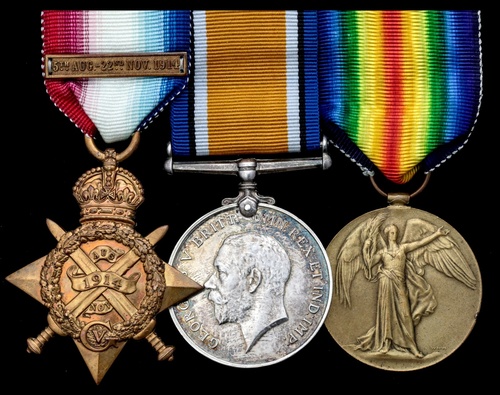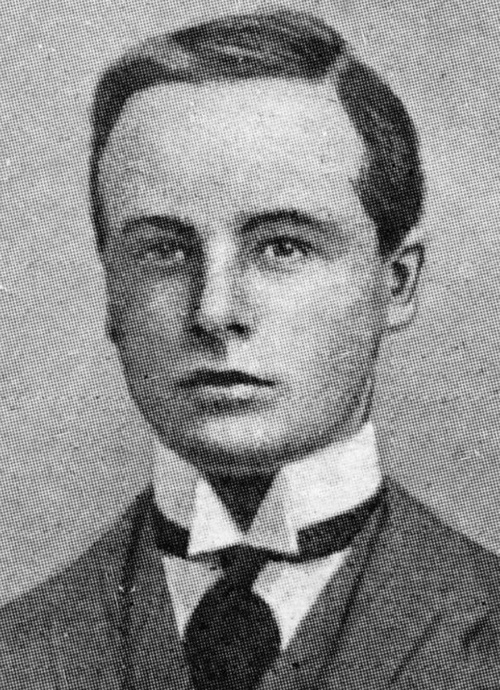Auction: 17002 - Orders, Decorations and Medals
Lot: 165
'Freddy Hardman had ability far beyond the average as the brief record of his scholastic achievements shows, but he was no mere book-worm. Endowed with a sparkling sense of humour and an attractive lisp, he carved a niche for himself from the very outset of his school career … Endowed with abilities of no mean order, buoyant spirits and personal charm, he would, but for the War, almost inevitably have made a name for himself in after life, but the lines of his fate were written otherwise, and when the call to action came, he followed proudly and gallantly in the traditions of his family'.
The Durnford School Memorial Book, refers.
A poignant B.E.F. 1914 casualty's group of three awarded to 2nd Lieutenant F. McM. 'Freddy' Hardman, Royal Fusiliers, who was killed in action whilst serving in the 4th Battalion at Neuve Chapelle in October 1914
Likely known to the poet Rupert Brooke and a friend of economist John Maynard Keynes, he had exchanged letters with the latter shortly before his death: 'So far I have not been hit or had any chance of it, only been frightened'
1914 Star, with clasp (2 Lieut. F. Mc. M. Hardman, R. Fus.); British War and Victory Medals (2 Lieut. F. M. Hardman, R. Fus.), good very fine (3)
Frederick McMahon 'Freddy' Hardman was born in 1890, the son of Captain W. J. Hardman, 1st Dragoons, of Castleton, Sherbourne, Dorset, who died during the Boer War, and a grandson of General Sir Thomas McMahon, C.B.
Having attended Durnford School, young Freddy entered Eton College as an Oppidan scholar and completed his education at King's College, Cambridge, where he achieved a First in Classics. Of his time at the famous university, the The Durnford Memorial Book states:
'At Cambridge he found himself launched into a singularly brilliant society. The Junior Fellows of King's had been recruited from amongst the ablest of the younger generation of Cambridge men, and several of them, such as Keynes, were destined to make a reputation far beyond the University. Rupert Brooke, if not actually in residence, was at Grantchester, and his influence in his college was at its height. Freddy Hardman seized with both hands his opportunities. While still a freshman he was absorbed into what may be called the inner circle of King's, and though he found time for reading, he never, to quote an American Professor, let his studies interfere with his education.'
Commissioned 2nd Lieutenant in the Royal Fusiliers on the Special Reserve in July 1912, he was quickly mobilised in August 1914. Just prior to his departure for France in the 4th Battalion in mid-September, he responded to a letter received from Sir John Sheppard, his old Classics Professor at Cambridge:
' … This is a wonderful war isn't it? And as the newspapers so aptly remark "no one can see the end". You know I was rather invisible at first. I thought our cause was a bad one and that we ought not fight at all. Grey's correspondence with all these diplomats has converted me … You mustn't think that I am converted to militarism for its own sake. But I think William must go and his party with him.
The quicker we get the dirty war over the better. We are very busy making preparations. You would scarcely believe what a curious business it is. Old bus-drivers, gardeners, professors, tradesmen, all sorts being drawn in uniformed and armed. We know no more of our future movements than what you can read in the papers but I expect we get away soon. Cambridge I should like to see in its warlike mood … '
Hardman's subsequent services in France were indelibly linked to his kinsman, Colonel Norman McMahon, who commanded the 4th Battalion, Royal Fusiliers and was known as the as the 'Musketry maniac': evidence of the Colonel's insistence on good shooting - 15 rounds per minute - may be found in his Battalion's part in the battle of Mons, when the Germans mistook the accurate, rapid fire of his - and other - British troops as the work of machine-guns.
Meanwhile, Hardman exchanged letters with John Maynard Keynes, writing on 14 October 1914, about a fortnight before his death in action, 'So far I have not been hurt or had any chance of it, only been frightened.' Keynes's reply, written on the day that Hardman died, wished him good luck in remaining 'undamaged': his wishes were in vain.
Of events at Neuve Chapelle on 27-28 October 1914, when Hardman was killed in action, the official history of Military Operations in France and Belgium 1914 states that his battalion was 'unable to progress further than the outskirts of the village, for the country was dotted with cottages from which snipers and machine-guns in comparative safety brought heavy fire to bear on the advance'.
A letter of condolence sent by Keynes elicited the following family response:
'It is most kind of you to write, I very much appreciate your sympathy in my great sorrow. Nothing can ever make up for me for Freddy's loss, and all that is left is to endure.
He was leading his men in a house to house attack; they had driven the enemy from the house, and were just advancing to another, when he was hit; he only lived for a few minutes and thank God was spared much suffering.
He had been fighting hard for some days, and on these previous occasions bullets had gone through his clothes. I am very proud of my boy, but it is difficult to give him up … '
Hardman has known grave and is commemorated on the Le Touret Memorial, in addition to the Durnfold School Memorial; sold with copied research.
Additional references sources:
Edmonds, Brigadier-General J. E., Military Operations in France and Belgium 1914 (MacMillan and Co., London, 1925).
http://www.oldwhitelodge.com/fmm.htm#fmh
King's College, Cambridge, Archive: JTS/2/91; JMK/PP/45/131.
Subject to 20% VAT on Buyer’s Premium. For more information please view Terms and Conditions for Buyers.
Estimate
£700 to £900







